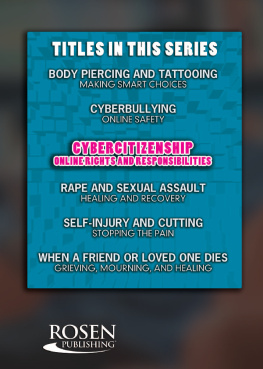Published in 2014 by The Rosen Publishing Group, Inc.
29 East 21st Street, New York, NY 10010
Copyright 2014 by The Rosen Publishing Group, Inc.
First Edition
All rights reserved. No part of this book may be reproduced in any form without permission in writing from the publisher, except by a reviewer.
Library of Congress Cataloging-in-Publication Data
Landau, Jennifer, 1961
Cybercitizenship: online rights and responsibilities/Jennifer Landau.
p. cm.(Helpline: teen issues and answers)
Includes bibliographical references and index.
ISBN 978-1-4488-9452-9 (library binding)
1. Internet and teenagers. 2. Technology and youth. 3. Internet literacy. 4. InternetSafety measures. 5. Online social networks. I. Title.
HQ799.2.I5L36 2014
004.6780835dc23
2012040149
Manufactured in the United States of America
CPSIA Compliance Information: Batch #S13YA: For further information, contact Rosen Publishing, New York, New York, at 1-800-237-9932.
CONTENTS
Introduction
Chapter 1 Projecting a Positive Image
Chapter 2 Privacy Concerns
Chapter 3 Plagiarism and Piracy
Chapter 4 Keeping Your Digital Information Safe
Chapter 5 Courtesy in the Online World
Glossary
For More Information
For Further Reading
Bibliography
Index
INTRODUCTION
If youre a twenty-first-century teen, youre a digital native. This term refers to a person who has grown up with technology like the Internet and is comfortable using it in all aspects of his or her life. The numbers bear this out. Data from a July 2011 study by the Pew Research Centers Internet & American Life Project shows that 95 percent of teens were online and 80 percent used social networking sites.
The popularity of certain types of social media can change quickly. In the movie Hes Just Not That into You, released in 2009, one character tells her coworkers that she was Myspaced by a man she liked. While that term might have sounded cool when the movie was being shot, by the time it came out, critics were making fun of it because Myspace had been outpaced by a new social networking site, Facebook. The 2011 Pew study reveals that 93 percent of teens had a Facebook account, while only 24 percent used Myspace. Perhaps in a few years, teens will make Twitter (which 12 percent of them used, according to the study), Tumblr (2 percent), or another form of social media number one.
No matter what platform you use, Web site you visit, or device you own, its important to follow certain rules of the road as youre traveling through cyberspace. Good cybercitizens know both their rights and responsibilities when interacting online. They stick to a code of conduct that makes a clear distinction between proper and improper behavior. This code of conduct is known as ethics (or cyber ethics when it refers to online behavior), and it will help you make smart and safe decisions when you use the Internet.
When using the Internet, its important to follow a code of conduct that distinguishes between proper and improper behavior. This code of conduct is known as cyber ethics.
As you read on, youll learn what it takes to be an excellent cybercitizen, including how to:
Protect your image
Guard your privacy and the privacy of others
Make sure the information you get online is reliable and that you have the right to use it
Avoid illegal downloads
Keep your information safe from malware that can destroy your computer
Follow proper net etiquette (netiquette) when communicating with others online
The Internet can be a great source of communication, information gathering, and entertainment. Its evolving at a lightning pace, too. Every day there are more apps, chat rooms, and ways to shop. Soon youll be able to leave your wallet at home when you go to a restaurant or store. Youll do everything with a wave of your smartphone. The possibilities are thrilling, but technology will never take the place of ethical behavior and common sense.
You are in charge of your privacy, your safety, and your reputation in cyberspace. Dont count on companies like Apple or Amazon to put your interests first. Government regulation, although bound to expand, will never erase the need for personal responsibility. By taking ownership of your online life, youre more likely to have a fulfilling experience as you move forward in an ever-connected world.
CHAPTER 1
Projecting a Positive Image
I n an interview on National Public Radios Fresh Air, James Steyer, author of Talking Back to Facebook, stated that when online, most teens self-reveal before they self-reflect. What does his comment mean? Steyer is saying that teens tend to be impulsive, and given how simple it is to send out a tweet or a post on Facebook, they might reveal things that they should have kept to themselves.
In the same interview, Steyer stated that nearly 40 percent of American teens between the ages of thirteen and seventeen posted something online that they later regretted. Even more startling, a full 80 percent thought their friends shared too much personal information online.
With your smartphone in your pocket or your laptop inches away, it is tempting to tweet about your every move or reply to a Facebook post that made you angry with a nasty comment of your own.
If youre upset by something a friend has posted online, take some time before responding. Acting impulsively could cause you to react in a way that youll regret later.
Try to resist the temptation. Constant updates on Facebook or Twitter are considered bad form and may lose you a friend or follower. People like to feel connected to you, not bombarded by your opinion on every pair of jeans youve tried on or fish taco youve eaten.
In addition, anything done in anger is the wrong move. This applies to tweets, Facebook or Tumblr posts, instant messaging (IM), a comment in a chat roomall of it. No matter what the format, the bottom line remains the same: there are real people with real feelings involved. Not avatars or GIFs or 140 characters arranged to say something clever. If you wouldnt say somethingor show a certain pictureif the person was standing in front of you, dont expect technology to let you off the hook. Should you get a negative response, blaming it on your device wont get you very far.
YOUR DIGITAL FOOTPRINT
Its not uncommon for a pregnant woman to post ultrasound photos of her unborn baby on Facebook. This means that a babys digital footprintthe information about a person that is available in cyberspacebegins before that baby takes his or her first breath of air. This trail of digital DNA continues throughout the persons life. Have you ever heard the phrase from the cradle to the grave? Well, thanks to cyberspace, your online presence is now from the ultrasound to the grave.
Ananda Mitra, professor of speech communication at Wake Forest University in North Carolina, calls this information narbs, which is shorthand for narrative bits. Narbs contain information like your gender, age, and location, as well as your opinions and interests. In short, thats anything you reveal about yourself based on your online interactions.













